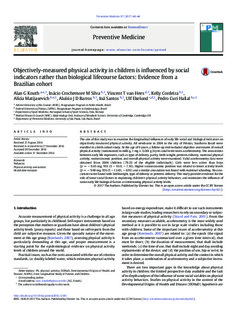| dc.contributor.author | Knuth, Alan G. | |
| dc.contributor.author | Silva, Inacio Crochemore M. | |
| dc.contributor.author | van Hees, Vincent T. | |
| dc.contributor.author | Cordeira, Kelly | |
| dc.contributor.author | Matijasevich, Alicia | |
| dc.contributor.author | Barros, Aluisio J. D. | |
| dc.contributor.author | Santos, Ina S. | |
| dc.contributor.author | Ekelund, Ulf | |
| dc.contributor.author | Hallal, Pedro Curi | |
| dc.date.accessioned | 2017-08-29T09:40:52Z | |
| dc.date.available | 2017-08-29T09:40:52Z | |
| dc.date.issued | 2017-04 | |
| dc.identifier.citation | Preventive Medicine. 2017, 97, 40-44 | nb_NO |
| dc.identifier.uri | http://hdl.handle.net/11250/2452189 | |
| dc.description.abstract | The aim of this study was to examine the longitudinal influences of early life social and biological indicators on objectively measured physical activity. All newborns in 2004 in the city of Pelotas, Southern Brazil were enrolled in a birth cohort study. At the age of 6 years, a follow-up visit included objective assessment of overall physical activity (summarized in milli-g, 1 mg = 0.001 g) by tri-axial wrist worn accelerometry. The associations between early life exposures, such as type of delivery, parity, birth weight, preterm delivery, maternal physical activity, socioeconomic position, and overall physical activity were examined. Valid accelerometry data were obtained from 2604 children (78.2% of the eligible individuals). Girls were less active than boys (β = − 8.65 mg; 95% CI − 10.0; − 7.30). Higher socioeconomic position was related to lower activity levels (β = − 9.69 mg. 95% CI − 12.45; − 6.93) and a similar association was found with maternal schooling. No associations were found with birthweight, type of delivery or preterm delivery. This study provides evidence for the role of some social factors in explaining children's physical activity behaviors, and minimizes the influence of some early life biological factors at determining physical activity levels. | nb_NO |
| dc.language.iso | eng | nb_NO |
| dc.publisher | Elsevier | nb_NO |
| dc.subject | pediatrics | nb_NO |
| dc.subject | physical activity assessment | nb_NO |
| dc.subject | health determinants | nb_NO |
| dc.title | Objectively-measured physical activity in children is influenced by social indicators rather than biological lifecourse factors: Evidence from a Brazilian cohort | nb_NO |
| dc.type | Journal article | nb_NO |
| dc.type | Peer reviewed | nb_NO |
| dc.source.journal | Preventive Medicine | nb_NO |
| dc.identifier.doi | 10.1016/j.ypmed.2016.12.051 | |
| dc.description.localcode | Seksjon for idrettsmedisinske fag / Department of Sports Medicine | nb_NO |
